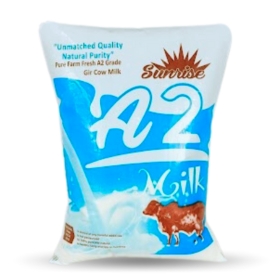
Milk is one of the richest food sources of calcium, which is necessary for strong bones and healthy teeth. One cup of milk provides between a half to a third of calcium’s recommended daily intake for a child (aged between 1-11 years) and around one third to a quarter of that for an adult. As calcium is present only in very small amounts in most common foods, it may be difficult for individuals who are restricted in their intake of milk and milk products to obtain the recommended amount. The health effects of milk may depend on the breed of the cow it came from. Currently, A2 milk is marketed as a healthier choice than regular A1 milk. Most cows’ milk brands today contain a mix of both A1 and A2 proteins. All a2 Milk™ products come from cows hand-picked to naturally produce only A2 protein and no A1 – and that makes all the difference.
A2 milk generally refers to a variety of cow's milk that mostly lacks a form of β-casein proteins called A1, and instead has mostly the A2 form. Cow's milk like this was brought to market by The a2 Milk Company and is sold mostly in Australia, New Zealand, China, the United States, and the United Kingdom. A1 and A2 beta-casein are genetic variants of the beta-casein milk protein that differ by one amino acid. A genetic test, developed by the a2 Milk Company, determines whether a cow produces A2 or A1 type protein in its milk. Recent research suggests that the A1 protein in regular cows’ milk might cause tummy discomfort in some of us. If that’s you, a2 Milk™ may help. But for the benefits of a2 Milk™ to work, it needs to be the real deal. From cows that naturally produce only the A2 protein and none of the A1. The reason behind growing demand for A2 milk is that it is believed that A2 is the original and natural protein which existed in cow milk since the very beginning, and A1 protein came along much later as a mutation with the increase in demand for high quantity and quality milk. The human body reacts to both the proteins (A1 and A2) differently because A1 has an amino acid called histidine and A2 has an amino acid called proline. As compared to A1 milk, A2 milk is much easier to digest for people with weak digestion. The A1 protein creates a protein fragmentation during digestion, known as beta-casomorphin-7 or BCM-7, which leads to discomfort. Talking about A2 milk benefits, it doesn’t contain BCM-7.
A2 is the purest and unaltered type of organic milk produced. Produced by cows that have been reared with care and reverence. These cows are fed by fodder, greens, vegetables, jaggery and natural foods, clean water and kept in healthy conditions. No special solutions or medicines are given to them to alter their milk. No machines are used and the upkeep and milking process is traditional and in the Vedic way. Our cows give much less milk compared to European ones. That is why European cow A1 milk is easily and cheaply available. A2 milk has high demand but desi cow A2 milk dairies are limited as most dairies converted to European cow A1 milk as they produce almost 5 times more milk in a day compared to desi cows. It is believed that A2 milk is safe to consume for infants as well, who have very sensitive digestive systems.
